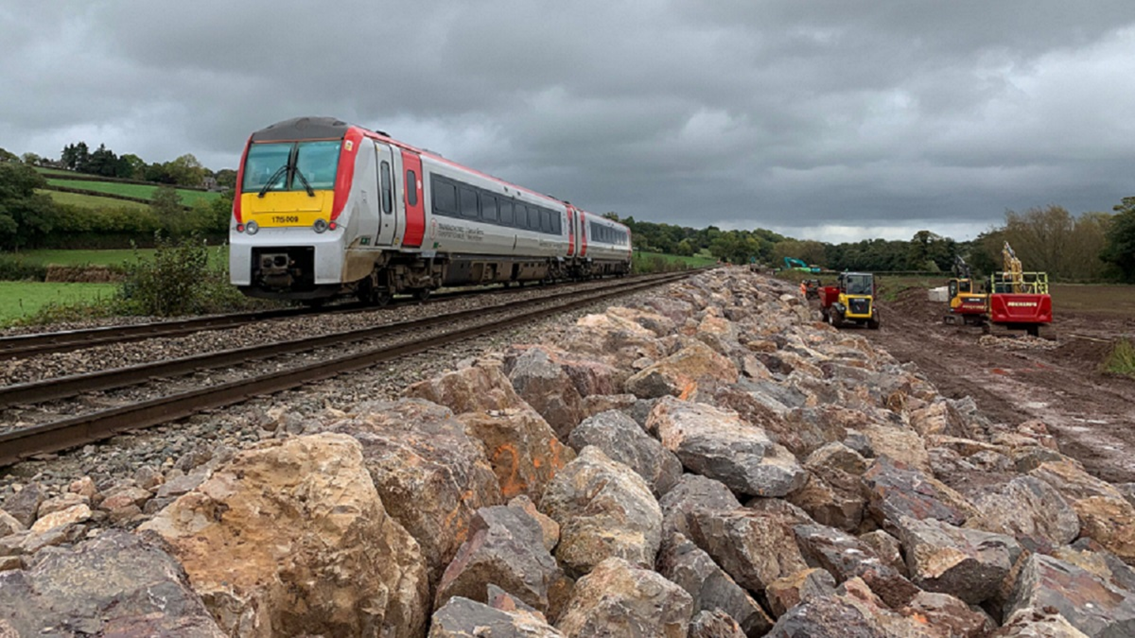Wednesday 24 Nov 2021
Rock and Rail: 8,000 tonnes of ‘rock armour’ installed to protect the future of flood-prone borders’ railway
- Region & Route:
- Wales & Western: Wales & Borders
Multi-million-pound investment on the railway between Hereford and Abergavenny to combat bad weather and minimise passenger disruption
An increase in extreme weather, over the past two years, has seen several washouts on the Marches Line, causing short notice closures, lasting up to seven days.
Closing this vital stretch of railway between Newport and Shrewsbury has a big impact on passengers and freight as many people use this line to reach other parts of the UK, including: Manchester, Birmingham and North Wales.
To minimise future disruption and delays, Network Rail engineers have installed half-a-mile of rock armour and refurbished culverts (under track drainage) between Hereford and Abergavenny; the same concept that has proved a huge success on a flood-prone stretch of railway in the Conwy Valley.
Ten trains were used to carry more than 8,000 tonnes of rock – locally sourced from Machen Quarry, in South Wales - to the work site. Using trains meant the project’s carbon footprint was significantly reduced - the equivalent journey by road would have used 400 lorries! Sourcing the material this quarry has not only reduced the carbon footprint of the project, but has shown Network Rail investing into the local economy.
The £4m work began in May 2021, with the first phase of the project completed in November. Further work will commence in Spring 2022, with more rock armour to be laid to future-proof the line against climate change.
Network Rail worked collaboratively with Natural England and the Environment Agency to ensure that all necessary steps were taken to reduce impact on natural wildlife and the environment.
Alex Hinshelwood, programme manager at Network Rail said:
“We know that rock armour works, as we’ve seen it in action on the Conwy Valley Line - where recent flooding there left the line closed for hours, instead of days.
“This is a huge benefit for passengers with less disruption to their journeys.
“We are dedicated to improving resilience across the Wales and Borders route and what we’ve installed here will protect the future of this stretch of railway for many years to come.”
This project is the most recent addition in a long line of Network Rail schemes dedicated to facing climate change and improving resilience across the whole Wales and Borders route, including raising Black Bridge out of a flood zone, landslip defence on the Severn Estuary, and rock armour installation on the Conwy Valley Line.
Contact information
Passengers / community members
Network Rail national helpline
03457 11 41 41
Latest travel advice
Please visit National Rail Enquiries
Journalists
Callum Jones
callum.jones2@networkrail.co.uk
About Network Rail
We own, operate and develop Britain's railway infrastructure; that's 20,000 miles of track, 30,000 bridges, tunnels and viaducts and the thousands of signals, level crossings and stations. We run 20 of the UK's largest stations while all the others, over 2,500, are run by the country's train operating companies.
Usually, there are almost five million journeys made in the UK and over 600 freight trains run on the network. People depend on Britain's railway for their daily commute, to visit friends and loved ones and to get them home safe every day. Our role is to deliver a safe and reliable railway, so we carefully manage and deliver thousands of projects every year that form part of the multi-billion pound Railway Upgrade Plan, to grow and expand the nation's railway network to respond to the tremendous growth and demand the railway has experienced - a doubling of passenger journeys over the past 20 years.
Follow us on Twitter: @networkrail
Visit our online newsroom: www.networkrailmediacentre.co.uk

